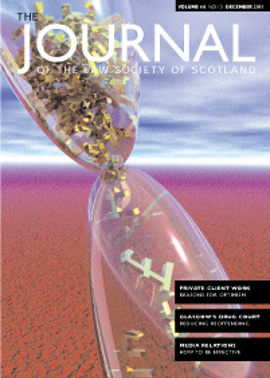Book reviews
Scotland hosts the headquarters of some of Europe’s largest banks and banking is now one of our major industries. Despite this most of the main Banking Law textbooks are published south of the border with the result that we have only a limited supply of banking textbooks available for Scottish students.
The publication of Mr Grier’s book is therefore to be welcomed as it presents a useful opportunity for consideration of some of the more recent developments in the field of banking law in Scotland. The author acknowledges that the book is not intended to provide comprehensive coverage of all banking related topics. With this in mind where he touches on specialist areas he provides some helpful guidance to readers who require more detailed commentary on the subject matter.
On reviewing the Contents section it was not surprising to see that many of the ‘boilerplate’ chapters of banking law books appear, such as those dealing with the structure and regulation of the UK Banking system, Types of Account and the Transfer of Money. One chapter did, however, catch the eye under the rather unusual title “The Responsible Bank”. In this chapter the author explains how banks operate under a complex web of legislation and codes of practice and touches on a number of issues which were not previously covered to any material extent in Scottish banking textbooks. The guidance provided in this chapter will be useful to Scots Banking Law students but may be less comprehensive than an experienced practitioner will require. For example, the author cites the case of Stafford v Conti Community Services Limited [1981] 1 ALL E.R.691 as authority for the proposition that “In certain circumstances, particularly those involving complicated financial transactions such as derivatives …. the complexity of the transaction is such that the customer takes the risk upon himself”. In light of the current stringent FSA rules relating to hedging and derivative transactions, a banker requires to satisfy himself that his customer was an experienced professional investor before he could be safe in assuming that a customer could take a risk of this kind upon himself, without adequate advice.
There are also useful chapters dealing with the relationship between a Bank and its Customers and the Banker-Customer contract as well as some useful information on a range of other everyday banking transactions.
One somewhat disconcerting feature of the book is the way in which related topics appear under apparently unrelated headings, e.g. in the chapter entitled “Types of Account” there is a section dealing with Arrestment of Bank Accounts. Elsewhere, the topic of inhibitions appears under the chapter headed “Security for Loans and their Documentation”.
Without detracting from the book’s value as a useful first point of reference to the subject there are a few areas where minor errors have not been picked up in the proof read. For example:
The increase in the level of loans affected by the Consumer Credit Act from £15,000 to £25,000 has not been identified.
Reference is made to the Solicitors Indemnity Fund rather than its Scottish equivalent of the Master Policy and Guarantee Fund.
In the section dealing with overdrafts it is suggested that sometimes the rate is a certain number of percentage points above the “LIBOR” (London Inter-Bank Offered Rate). Experienced banking lawyers will recognise that LIBOR related rates are not normally available on overdrafts and are generally confined to term lending facilities.
The paragraphs dealing with the vexed question of ‘Guarantees given under pressure’ and The need for Independent Advice’ was unfortunately written before the landmark judgment issued by the House of Lords in Royal Bank of Scotland v Etridge. While Mr Grier highlights the key pitfalls to be avoided practitioners will need to pay heed to the more detailed guidance provided by their Lordships in the case of Etridge.
Derek Arnott
In this issue
- President’s report
- Bright future in private client work
- Generating profits in larger firms
- The Glasgow drug court
- Time to think again
- Navigating the media maze
- Legal aid for employment tribunals – at last
- Winning pitches, or learning when to shut up
- All I want for Christmas is some PKI – I think
- Time for fundamental review of children’s evidence
- Risks in advising spouses – the Etridge effect
- European update
- Book reviews






